2012届高考英语考前冲刺押题语法专题-非谓语动词
- 格式:doc
- 大小:464.00 KB
- 文档页数:8
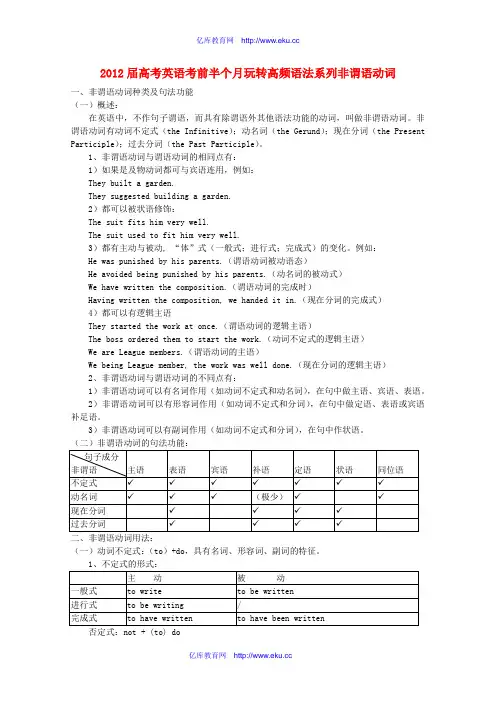
2012届高考英语考前半个月玩转高频语法系列非谓语动词一、非谓语动词种类及句法功能(一)概述:在英语中,不作句子谓语,而具有除谓语外其他语法功能的动词,叫做非谓语动词。
非谓语动词有动词不定式(the Infinitive);动名词(the Gerund);现在分词(the Present Participle);过去分词(the Past Participle)。
1、非谓语动词与谓语动词的相同点有:1)如果是及物动词都可与宾语连用,例如:They built a garden.They suggested building a garden.2)都可以被状语修饰:The suit fits him very well.The suit used to fit him very well.3)都有主动与被动, “体”式(一般式;进行式;完成式)的变化。
例如:He was punished by his parents.(谓语动词被动语态)He avoided being punished by his parents.(动名词的被动式)We have written the composition.(谓语动词的完成时)Having written the composition, we handed it in.(现在分词的完成式)4)都可以有逻辑主语They started the work at once.(谓语动词的逻辑主语)The boss ordered them to start the work.(动词不定式的逻辑主语)We are League members.(谓语动词的主语)We being League member, the work was well done.(现在分词的逻辑主语)2、非谓语动词与谓语动词的不同点有:1)非谓语动词可以有名词作用(如动词不定式和动名词),在句中做主语、宾语、表语。
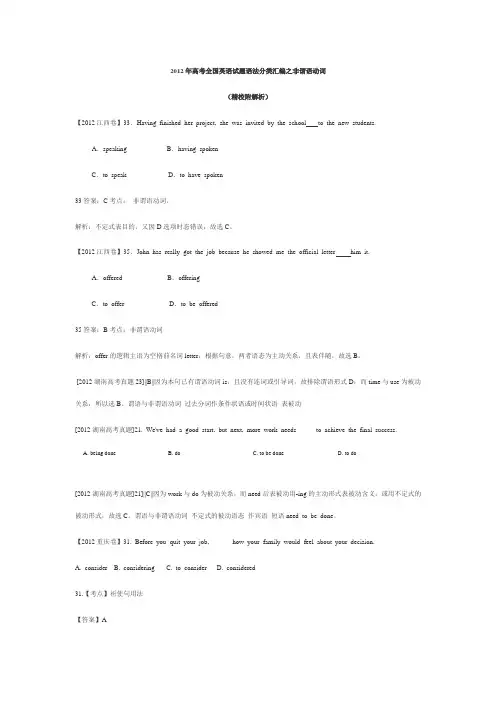
2012年高考全国英语试题语法分类汇编之非谓语动词(精校附解析)【2012江西卷】33.Having finished her project, she was invited by the school to the new students.A.speaking B.having spokenC.to speak D.to have spoken33答案:C考点:非谓语动词。
解析:不定式表目的,又因D选项时态错误,故选C。
【2012江西卷】35.John has really got the job because he showed me the official letter him it.A.offered B.offeringC.to offer D.to be offered35答案:B考点:非谓语动词解析:offer的逻辑主语为空格前名词letter,根据句意,两者语态为主动关系,且表伴随,故选B。
[2012湖南高考真题23]||B||因为本句已有谓语动词is,且没有连词或引导词,故排除谓语形式D;而time与use为被动关系,所以选B。
谓语与非谓语动词过去分词作条件状语或时间状语表被动[2012湖南高考真题]21. We'v e had a g ood start, bu t next, more work needs ____ to achieve the final success.A. being doneB. doC. to be doneD. to do[2012湖南高考真题]21]||C||因为work与d o为被动关系,而need后表被动用-ing的主动形式表被动含义,或用不定式的被动形式,故选C。
谓语与非谓语动词不定式的被动语态作宾语短语need to be done。
【2012重庆卷】31. Before you quit your job, ______how your family would feel abou t your decision.A. considerB. consideringC. to considerD. considered31.【考点】祈使句用法【答案】A【解析】结合选项来分析句子结构,逗号前为时间状语从句,后面实际上是一个祈使句。
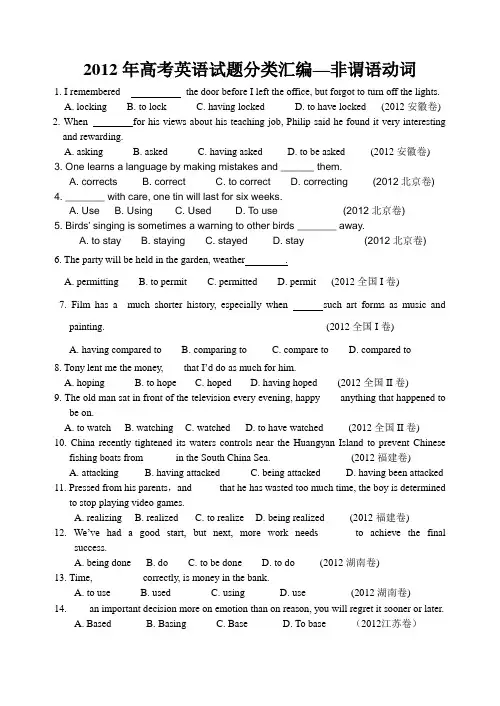
2012年高考英语试题分类汇编—非谓语动词1. I remembered the door before I left the office, but forgot to turn off the lights.A. lockingB. to lockC. having lockedD. to have locked (2012安徽卷)2. When for his views about his teaching job, Philip said he found it very interesting and rewarding.A. askingB. askedC. having askedD. to be asked (2012安徽卷)3. One learns a language by making mistakes and ______ them.A. correctsB. correctC. to correctD. correcting (2012北京卷)4. _______ with care, one tin will last for six weeks.A. UseB. UsingC. UsedD. To use (2012北京卷)5. Birds’ singing is sometimes a warning to other birds _______ away.A. to stayB. stayingC. stayedD. stay (2012北京卷)6. The party will be held in the garden, weather .A. permittingB. to permitC. permittedD. permit (2012全国I卷)7. Film has a much shorter history, especially when_ such art forms as music andpainting. (2012全国I卷)A. having compared toB. comparing toC. compare toD. compared to8. Tony lent me the money, ___ that I’d do as much for him.A. hopingB. to hopeC. hopedD. having hoped (2012全国II卷)9. The old man sat in front of the television every evening, happy ___ anything that happened tobe on.A. to watchB. watchingC. watchedD. to have watched (2012全国II卷)10. China recently tightened its waters controls near the Huangyan Island to prevent Chinesefishing boats from ______in the South China Sea. (2012福建卷)A. attackingB. having attackedC. being attackedD. having been attacked11. Pressed from his parents,and _____that he has wasted too much time, the boy is determinedto stop playing video games.A. realizingB. realizedC. to realizeD. being realized (2012福建卷)12. We’ve had a good start, but next, more work needs ______to achieve the finalsuccess.A. being doneB. doC. to be doneD. to do (2012湖南卷)13. Time, _________ correctly, is money in the bank.A. to useB. usedC. usingD. use (2012湖南卷)14. ____an important decision more on emotion than on reason, you will regret it sooner or later.A. BasedB. BasingC. BaseD. To base (2012江苏卷)15. Having finished her project, she was invited by the school to the new students.A. speakingB. having spokenC. to speakD. to have spoken (2012江西卷)16. John has really got the job because he showed me the official letter him it.A. offeredB. offeringC. to offerD. to be offered (2012江西卷)17. The old couple often take a walk after supper in the park with their pet dog them.A. to followB. followingC. followedD. follows (2012辽宁卷)18. This machine is very easy . Anybody can learn to use it in a few minutes.A. operatingB. to be operatingC. operatedD. to operate (2012辽宁卷)19. George returned after the war, only _______ that his wife had left him.A. to be toldB. tellingC. being toldD. told (2012山东卷)20. After completing and signing it, please return the form to us in the envelope ________.A. providingB. providedC. having providedD. provide (2012山东卷)21. As Jack left his membership card at home, he wasn't allowed into the sports club.A. goingB. to goC. goD. gone (2012上海卷)22. When Peter speaks in public, he always has trouble _ the right things to say.A. thinking ofB. to think ofC. thought ofD. think of (2012上海卷)23. The club, _ _ 25 years ago, is holding a party for past and present members.A. foundedB. foundingC. being foundedD. to be founded (2012上海卷)24. "Genius" is a complicated concept, _ _ many different factors.A. involvedB. involvingC. to involveD. being involved (2012上海卷)25. Tom took a taxi to the airport, only _____ his plane high up in the sky.A. findingB. to findC. being foundD. to have found (2012四川卷)26. I looked up and noticed a snake ______ its way up the tree to catch its breakfast.A. to windB. windC. windingD. wound (2012四川卷)27. He got up late and hurried to his office, _________the breakfast untouched.A. leftB. to leaveC. leavingD. having left (2012天津卷)28. No matter how bright a talker you are, there are times when it's better _________ silent.A. remainB. be remainingC. having remainedD. to remain (2012浙江卷)29. "It's such a nice place," Mother said as she sat at the table________ for customs.A. to be reservedB. Living reservedC. reservingD. reserved (2012浙江卷)30. ______to work overtime that evening, I missed a wonderful film.A. Having been askedB. To askC. Having askedD. To be asked (2012重庆卷)31. We’re having a meeting in half an hour. The decision ______at the meeting will influence thefuture of our company. (2012重庆卷)A. to be madeB. being madeC. madeD. having been madeBBDCA ADAAC ACBBC BBDAB BAABB CCDDA A。
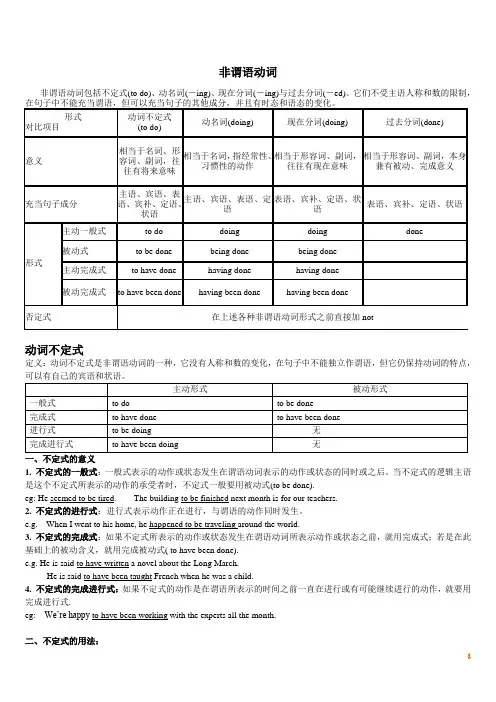
非谓语动词非谓语动词包括不定式(to do)、动名词(-ing)、现在分词(-ing)与过去分词(-ed)。
它们不受主语人称和数的限制,动词不定式定义:动词不定式是非谓语动词的一种,它没有人称和数的变化,在句子中不能独立作谓语,但它仍保持动词的特点,一、不定式的意义1. 不定式的一般式:一般式表示的动作或状态发生在谓语动词表示的动作或状态的同时或之后。
当不定式的逻辑主语是这个不定式所表示的动作的承受者时,不定式一般要用被动式(to be done).eg: He seemed to be tired. The building to be finished next month is for our teachers.2. 不定式的进行式:进行式表示动作正在进行,与谓语的动作同时发生。
e.g. When I went to his home, he happened to be traveling around the world.3. 不定式的完成式:如果不定式所表示的动作或状态发生在谓语动词所表示动作或状态之前,就用完成式;若是在此基础上的被动含义,就用完成被动式( to have been done).e.g. He is said to have written a novel about the Long March.He is said to have been taught French when he was a child.4. 不定式的完成进行式:如果不定式的动作是在谓语所表示的时间之前一直在进行或有可能继续进行的动作,就要用完成进行式.eg: We’re happy to have been working with the experts all the month.二、不定式的用法:1. 不定式做主语:不定式做主语一般表示具体的某次动作。
而动名词doing 表示习惯的,经常的动作。
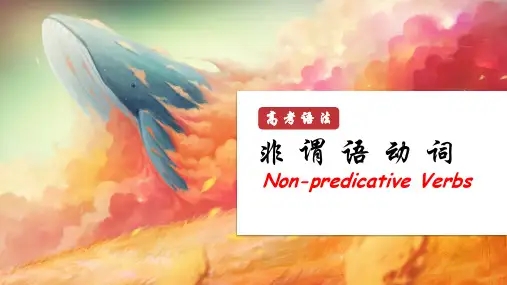
![2012届高考英语语法精讲精练-非谓语动词[学生版]](https://uimg.taocdn.com/3fb7228771fe910ef12df8e0.webp)
2012届新课标高三第二轮专题讲解非谓语动词是高考的重点和热点,也是我们英语学习中所碰到的难点之一。
非谓语动词分为三种形式:不定式,V-ing分词(又分为现在分词和动名词)和过去分词。
注:常见作独立成分的非谓语动词to tell you the truth(实话说),needless to say(不用说),to be honest/frank(老实说,坦白说),to be more exact(更确切地说),to make things worse (更糟的是),not to mention…(更不用说),Generally / Frankly / Roughly speaking (一般说来 / 坦白说 / 粗略地说)(一)辨别谓语与非谓语特别注意分析句子的结构才能辨别谓语与非谓语。
①The traffic rule says young children under the age of four and __ less than 40 poundsmust be in a child safety seat.A. being weighedB. weighsC. weighedD. weighing【解析】容易误选B或C,将其当成谓语看待。
under the age of four and ____ less than40 pounds用作children的定语。
动词weigh与名词children是主动关系,所以选择weighing。
②______ blood if you can and many lives will be saved.A. GivingB. GiveC. GivenD. To give【解析】如果不注意分析句子结构,会误选A或C项。
这是祈使句+and+陈述句的句型。
答案B。
(二)非谓语作主语、宾语的重点1.it充当动词不定式的形式主语或形式宾语①It is important for us to learn English very well.对我们来说学好英语是非常重要的。
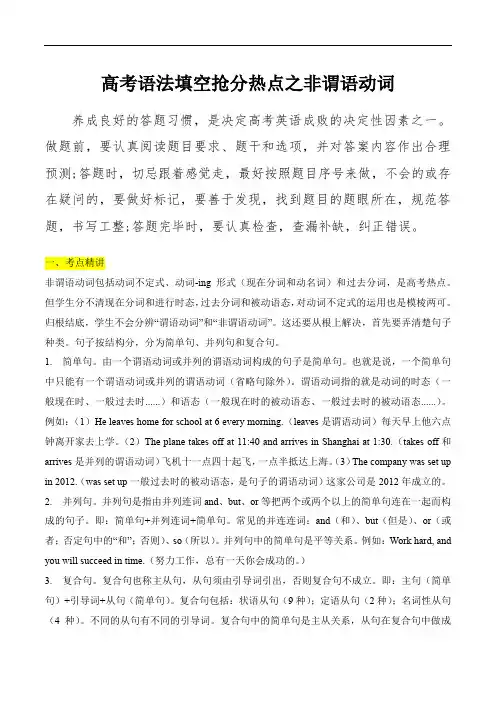
高考语法填空抢分热点之非谓语动词养成良好的答题习惯,是决定高考英语成败的决定性因素之一。
做题前,要认真阅读题目要求、题干和选项,并对答案内容作出合理预测;答题时,切忌跟着感觉走,最好按照题目序号来做,不会的或存在疑问的,要做好标记,要善于发现,找到题目的题眼所在,规范答题,书写工整;答题完毕时,要认真检查,查漏补缺,纠正错误。
一、考点精讲非谓语动词包括动词不定式、动词-ing形式(现在分词和动名词)和过去分词,是高考热点。
但学生分不清现在分词和进行时态,过去分词和被动语态,对动词不定式的运用也是模棱两可。
归根结底,学生不会分辨“谓语动词”和“非谓语动词”。
这还要从根上解决,首先要弄清楚句子种类。
句子按结构分,分为简单句、并列句和复合句。
1.简单句。
由一个谓语动词或并列的谓语动词构成的句子是简单句。
也就是说,一个简单句中只能有一个谓语动词或并列的谓语动词(省略句除外)。
谓语动词指的就是动词的时态(一般现在时、一般过去时......)和语态(一般现在时的被动语态、一般过去时的被动语态......)。
例如:(1)He leaves home for school at 6 every morning.(leaves是谓语动词)每天早上他六点钟离开家去上学。
(2)The plane takes off at 11:40 and arrives in Shanghai at 1:30.(takes off和arrives是并列的谓语动词)飞机十一点四十起飞,一点半抵达上海。
(3)The company was set up in 2012.(was set up一般过去时的被动语态,是句子的谓语动词)这家公司是2012年成立的。
2.并列句。
并列句是指由并列连词and、but、or等把两个或两个以上的简单句连在一起而构成的句子。
即:简单句+并列连词+简单句。
常见的并连连词:and(和)、but(但是)、or(或者;否定句中的“和”;否则)、so(所以)。
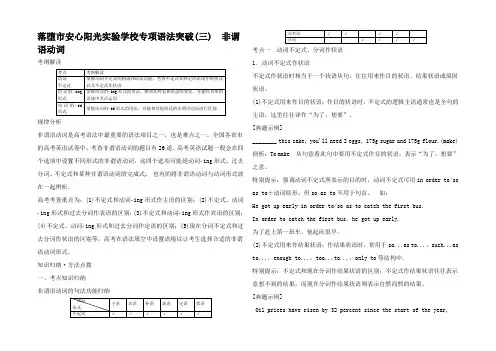
落堕市安心阳光实验学校专项语法突破(三) 非谓语动词考纲解读规律分析非谓语动词是高考语法中最重要的语法项目之一,也是难点之一。
全国各省市的高考英语试卷中,考查非谓语动词的题目有26道。
高考英语试题一般会在四个选项中设置不同形式的非谓语动词,这四个选项可能是动词ing形式、过去分词、不定式和某种非谓语动词的完成式,也有的将非谓语动词与动词形式放在一起辨析。
高考考查重点为:(1)不定式和动词ing形式作主语的区别;(2)不定式、动词ing形式和过去分词作表语的区别;(3)不定式和动词ing形式作宾语的区别;(4)不定式、动词ing形式和过去分词作定语的区别;(5)现在分词不定式和过去分词作状语的区别等。
高考在语法填空中设置语境以让考生选择合适的非谓语动词形式。
知识归纳·方法点拨一、考点知识归纳非谓语动词的句法功能归纳考点一动词不定式、分词作状语1.动词不定式作状语不定式作状语时相当于一个状语从句,往往用来作目的状语、结果状语或原因状语。
(1)不定式用来作目的状语:作目的状语时,不定式的逻辑主语通常也是全句的主语,这里往往译作“为了,想要”。
[典题示例]________ this cake, you'll need 2 eggs, 175g sugar and 175g flour.(make)剖析:To make 从句意看此句中要用不定式作目的状语,表示“为了,想要”之意。
特别提示:强调动词不定式所表示的目的时,动词不定式可用in order to/so as to+动词原形,但so as to不用于句首。
如:He got up early in order to/so as to catch the first bus.In order to catch the first bus,he got up early.为了赶上第一班车,他起床很早。
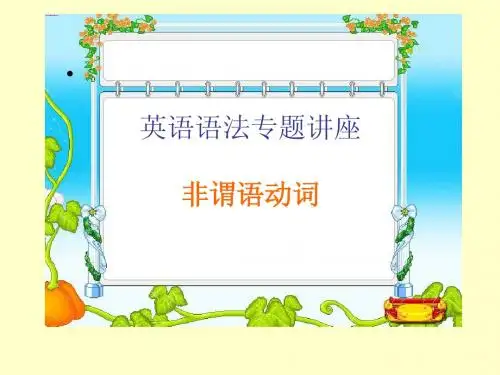
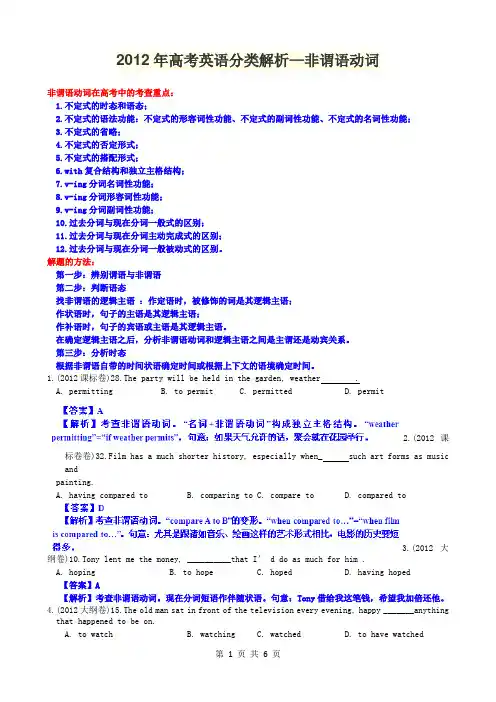
2012年高考英语分类解析—非谓语动词非谓语动词在高考中的考查重点:1.不定式的时态和语态;2.不定式的语法功能:不定式的形容词性功能、不定式的副词性功能、不定式的名词性功能;3.不定式的省略;4.不定式的否定形式;5.不定式的搭配形式;6.with复合结构和独立主格结构;7.v-ing分词名词性功能;8.v-ing分词形容词性功能;9.v-ing分词副词性功能;10.过去分词与现在分词一般式的区别;11.过去分词与现在分词主动完成式的区别;12.过去分词与现在分词一般被动式的区别。
解题的方法:第一步:辨别谓语与非谓语第二步:判断语态找非谓语的逻辑主语:作定语时,被修饰的词是其逻辑主语;作状语时,句子的主语是其逻辑主语;作补语时,句子的宾语或主语是其逻辑主语。
在确定逻辑主语之后,分析非谓语动词和逻辑主语之间是主谓还是动宾关系。
第三步:分析时态根据非谓语自带的时间状语确定时间或根据上下文的语境确定时间。
1.(2012课标卷)28.The party will be held in the garden, weather .A. permittingB. to permitC. permittedD. permit2.(2012课标卷卷)32.Film has a much shorter history, especially when_ such art forms as music andpainting.A. having compared toB. comparing toC. compare toD. compared to3.(2012大纲卷)10.Tony lent me the money, __________that I’ d do as much for him .A. hopingB. to hopeC. hopedD. having hoped【答案】A【解析】考查非谓语动词。
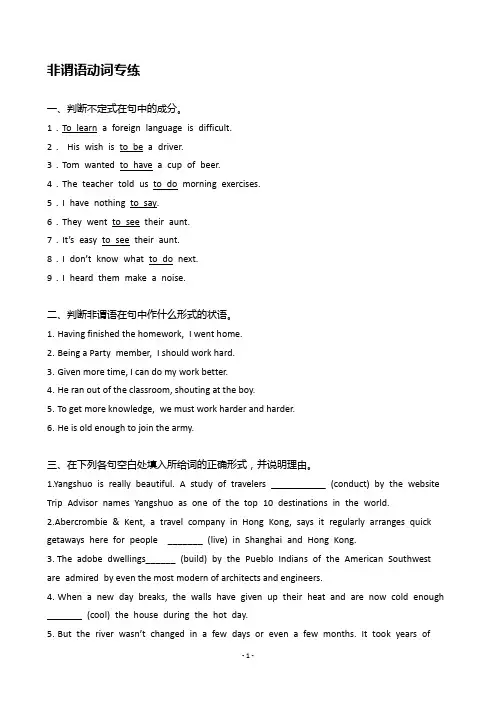
非谓语动词专练一、判断不定式在句中的成分。
1.To learn a foreign language is difficult.2.His wish is to be a driver.3.Tom wanted to have a cup of beer.4.The teacher told us to do morning exercises.5.I have nothing to say.6.They went to see their aunt.7.It’s easy to see their aunt.8.I don’t know what to do next.9.I heard them make a noise.二、判断非谓语在句中作什么形式的状语。
1.Having finished the homework, I went home.2.Being a Party member, I should work hard.3.Given more time, I can do my work better.4.He ran out of the classroom, shouting at the boy.5.To get more knowledge, we must work harder and harder.6.He is old enough to join the army.三、在下列各句空白处填入所给词的正确形式,并说明理由。
1.Yangshuo is really beautiful. A study of travelers ___________ (conduct) by the website Trip Advisor names Yangshuo as one of the top 10 destinations in the world.2.Abercrombie & Kent, a travel company in Hong Kong, says it regularly arranges quick getaways here for people _______ (live) in Shanghai and Hong Kong.3. The adobe dwellings______ (build) by the Pueblo Indians of the American Southwest are admired by even the most modern of architects and engineers.4.When a new day breaks, the walls have given up their heat and are now cold enough _______ (cool) the house during the hot day.5.But the river wasn’t changed in a few days or even a few months. It took years ofwork _________ (reduce) the industrial pollution and clean the water.6.While there are ________ (amaze) stories of instant transformation, for most of us the changes are gradual and require a lot of effort and work, like cleaning up a polluted river.7. One morning, I was waiting at the bus stop, worried about ______ (be) late for school.8. There were many people waiting at the bus stop, and some of them looked very anxious and ______________ (disappoint).9.I heard a passenger behind me shouting to the driver, but he refused _________ (stop) until we reached the next stop.四、句子改错,每个句子有一处错误,请找出并改正。
2012届高考英语二轮语法复习学案(非谓语动词)非谓语动词(一)——动词不定式动词不定式、分词(现在分词,过去分词)和动名词统称为非谓语动词。
现代英语将现在分词和动名词合为一大类叫作v + ing形式。
这些动词的形式不能在句中单独作谓语用,因而没有语法主语。
但可以有逻辑主语。
由于没有语法主语,也就不受人称和数的限定,因为不是谓语,也就没有时态和语态,但这些词仍能表示动作和状态,所以仍有表示与其他动词相对时间关系的形式。
由于与其它词有逻辑上的主谓关系,因此也有表示主、被动的形式,同时也有自己的宾语和状语,一起构成非谓语动词的短语(动词不定式短语,分词短语,动名词短语)。
非谓语动词在英语语法中占有特殊且重要的位置。
非谓语动词形式多样,应用广泛,且在句中起着很活跃的作用,也是语法项目中的重点和难点,学好非谓语动词,才能正确进行口语和书面的交流。
动词不定式、过去分词及v-ing形式在句中均不能作谓语用,所以叫做非谓语动词。
(一)动词不定式:动词不定式由“to+ 动词原形”构成,如:to study, to play,动词不定式虽然不能作谓语动词用,但仍留着动词的特征,它可以带有所需要的宾语或状语而构成动词不定式短语,如:to study hard, to play table tennis。
1、动词不定式的形式变化:动词不定式有下列时态和语态的形式变化。
语态式一般式完成式进行式完成进行式主动to build to have built to be building to have been building被动to be build to have been build2、动词不定式的基本用法:动词不定式能起名词、形容词和副词的作用,可在句中作主语、表语、宾语补足语、定语和状语用,如:(1)作主语:To help each other is good.(动词不定式作主语时,一般可用it作形式主语,而将作主语的动词不定式置于句末,如:It is good to help each other.(2)作表语:My job is to drive them to the power station every day. 动词不定式在系动词be之后作表语,与表示将来时的be + 动词不定式结构有所区别,如:Our plan is to set up another middle school for the peasants’children.我们的计划是给农民子弟再成立一所中学。
2012届高考英语语法精练-非谓语动词1. Though ________ money, his parents managed to send him to university.A. lackedB. lacking ofC. lackingD. lacked in2. The lady said she would buy a gift for her daughter with the ________.A. 20 dollars remainedB. 20 dollars to remainC. remained 20 dollarsD. remaining 20 dollars3. --It will take us 15 hours _______ Weihai by bus.--Why not try ______ a ship? It's quicker by water than by road.A. to-go to; to takeB. going to; takingC. to go to; takingD. going to; to take4. Though the policemen got ________ after looking for the murder in the city for a whole day, they felt excitedwhen finding the __________ knife by the lake.A. exhausting; abandoningB. exhausted; abandonedC. exhausted; abandoningD. exhausting; abandoned5. My father used to ______ coffee in the morning, but now he is used to ______ tea --- he thinks it’s healthier.A. drink; drinkB. drinking; drinkingC. drink; drinkingD. drinking; drink6. _______ make any mistakes in the exam. I went over what I had learnt again and again.A. In order toB. So as to notC. So as toD. In order not to7. Mr. Smith, ________ in the factory for thirty years, is on the way back to his village.A. to workB. workingC. to have workedD. having worked8. ---How about ________ something to eat?---I'd rather _______ a drink. I am really thirsty.A. have; havingB. having; haveC. have; to haveD. having; to have9. I've been considering _______ my job as a teacher because a teacher is often considered _______ a gardener.A. to change; to beB. to change; beingC. changing; beingD. changing; to be10. ______ in the 1980's, it's the first factory ______ colour TV sets of high quality.A. Founded; producingB. Founded; to produceC, Founding; having produced D. Founding; produced11. All the members of my family, ______ my grandparents, are fond of different kinds of sports, football ________.A. including; includedB. including; includingC. included; includingD. included; included12. My little daughter poured ink over my painting, completely _______ it.A. ruiningB. ruinsC. ruinedD. ruin13. He is the youngest in the family, but he hated _______ a child.A. being treated asB. treating as C to treat as D. to be treated to14. ---My watch has been losing time for the past week.--It probably needs ________.A. cleanB. cleanedC. to cleanD. cleaning15. _______ the problem of rising costs, the man decided to search for another job to support his large family.A. Facing withB. To face withC. FaceD. Faced with16. Greatly ______ as the leading scientist, he was asked to give lectures in many countries.A. respectingB. respectsC. respectedD. to respect17. _______ in the book he is crazy about, he didn't hear his mother enter the room.A. BuriedB. BuryingC. To buryD. Being burying18. The picture ______ the wall was drawn by one of his students.A. attaching toB. attaching onC. attached toD. attached on19. Don't rely on _______ for our holiday, because we may not be able to afford it.A. to go abroadB. go abroadC. going abroadD. gone abroad20. The manager discussed the plan they would like to see _______ the next year.A. carry outB. carrying outC. to carry outD. carried out21. The book you lent me last week is excellent. I think it is worth ______ a second time.A. to readB. to be readC. readingD. being read22. Turning around, I saw a little boy standing behind the tree, _______ at me curiously.A. staredB. to stareC. staringD. having stared23. ______ that they are inexperienced in this field, they've done a good job.A. GivingB. To jiveC. GivenD. Being given24. The ship, _________ with rice and wheat, has set sail for Africa.A. loadingB. loadedC. to loadD. having loaded25. It was fortunate that Jack narrowly escaped ________ in a traffic accident.A. killingB. being killedC. to be killedD. to kill26. This novel is based on a true story of a famous star, so once ________, it will be very popular.A. publishesB. having publishedC. publishingD. published27. ---How can a blind man know what something is?--- By feeling and ________.A. touchB. touchingC. to touchD. touched28. The driver was sad when word came that he was forbidden ________ for speeding.A. to driveB. drivingC. driveD. driven .29. No one is allowed, no matter who he is, _______ the room unless he has a permit.A. entersB. enteringC. to enterD. entered30. Like many people, I dare not go out alone after dark because I'm afraid of ______.A. attackingB. being attackedC. having attackedD. attacked31. The key to ____ our world a comfortable and clean place to live in is to ____ industrial pollution.A. keeping; controlB. keeping; controllingC. keep; controlD. keep; controlling32. The driver is required by law, no matter who he is, ______ seat belt while on the road.A. wearingB. wornC. to wearD. wear33. I plan to have my daughters _______ at the best school in our city.A. educateB. to educateC. being educatedD. educated34. Now that you've got a chance, you should make full use of it. Once _______, it will never come again.A. lostB. losingC. having lostD. being lost35. The snowstorm left, _______ severe damage to many provinces in southern China.A. causedB. had causedC. to causeD. having caused36. ______ delicious, the fried chicken in this shop is always selling well.A. TastedB. Being tastedC. TastingD. To taste37. The reporters hurried to the airport, only ______ that the film stars had just left by air.A. tellingB. being toldC. to tellD. to be told38. A team, _____ two doctors and three policemen, was sent to search for the lost explorers.A. consisting ofB. consists ofC. consisted ofD. to be consisted of39. In front of the booking office stood a long queue of Kelly Chen's fans, ________ to get a ticket for her concert.A. to expectB. expectedC. were expectingD. expecting40. I meant __________ that refusing him meant ________ up all our hope.A. to say; to giveB. to say; giving C: saying; to give D. saying; giving41. With some important problems _________, they have decided to restart the both-side talks next week.A. settledB. settlingC. to settleD. to he settled42. The aim of this training is ______ all the injured _______ timely when a fire occurs.A. having; treatB. to have; treatC. having; to treatD. have; treated43. The three-storey building, _______ in the 18th century, was turned into a museum in 1960.A. constructingB. constructedC. being constructedD. when constructed44. ______ a clear idea of how this machine works, Mary is referring to lots of materials.A. GainedB. GainingC. To have gainedD. To gain45. Referring to his notes during that important test led to _________.A. having punished the boyB. punishing the boyC. the boy being punishedD. the boy to be punished46. _______ honesty and justice caused him to lose popularity among his workers.A. Wilson's lackedB. Wilson's lackingC. Wilson lackedD. Wilson to lack47. ______ on my computer, I found an e-mail from my pen friend, _____ me to spend the summer holiday in his city.A. On turning; invitedB. On turning; invitingC. When having turned; to inviteD. After having turned; inviting48. Alice didn't notice I was coming, her mind _________ the work she was doing.A. was totally fixed onB. was totally fixing onC. totally fixed onD. totally fixing on49. The old man sitting opposite me cleared his throat as if ________ something.A. saidB. to sayC. having saidD. saying50. I failed my final exam last term. How I regretted ________ the teacher's advice.A. to takeB. takingC. not to takeD. not having taken51. ________ table manners, I can't stand people ________ with their mouths full.A. Regard; to speakB. Regard; speakingC. Regarding; speakingD. Regarding; to speak52. That was a terrible night. The rain was pouring down, _______ thunder and lightning.A. accompaniedB. accompanied byC. accompanyingD. accompanies53. With my husband _________ in Birmingham, I felt lonely staying in such a big house.A. workingB. workedC. having workedD. works54. Four _______ by seven is twenty-eight. In other words, twenty-eight divided by seven is four.A. is multipliedB. multipliesC. multipliedD. multiplying55. --Why not take a ship for a change this time?--Sounds great. It deserves ________A. consideredB. to considerC. consideringD. being considered56. You're supposed _________ me, not reading a magazine in the class now.A. to listen toB. having listened toC. listening toD. to be listening to57. You have to prove yourself ______ innocent, that is, you had nothing to do with the murder.A. to beB. areC. wereD. being58. It remains _______ whether the elderly will actually benefit from this plan.A. to be seenB. seenC. seeingD. to see59. It is a waste of time ____ such a person to join us because he will never change his mind.A. your persuadingB. you persuadedC. of you to persuadeD. for you persuading60. I know it's time I got down _____ my homework, but I just can't resist _____ computer games.A. to doing; playingB. to do; to playC. to doing; to playD. to do; playing61. I approve of _______to earn some money, but please don't neglect your studies.A. you to tryB. you tryC. your tryD. you trying62. Lucy does nothing but ________ all day long, which makes me upset.A. having complained.B. complainingC. complainD. complained63. Your clothes want _________. You should have it done if you have time now.A. washB. to washC. washingD. being washed64. When caught _________, he begged for my pardon and tried ________ punishment.A. cheating; escapingB. cheating; to escapeC. to be cheating; escapingD. to be cheating; to escape65. Your time should have been made full use of _______ the final exams, but, to my regret, it wasn't.A. to passB. passingC. to have passedD. having passed66. Mr. Smith, _________ with a new mayor, is giving his farewell speech at the meeting.A. replacedB. to be replacedC. to replaceD. being replaced67. The policy is partly ________ for causing the worst unemployment in Europe.A. to be blamedB. to blameC. being blamingD. blaming68. --We didn't find the Blacks attending the lecture.--No one had told them about __________ a lecture.A. there to beB. there beingC. there beD. there was69. There was a terrible noise _________ the sudden burst of light.A. followedB. followingC. to be followedD. being followed70. David never dreamed of ________ a chance for him to win the first prize in singing.A. there wasB. there beingC. it beingD. it was71. The purpose of new technologies is to make life easier, ______ it more difficult.A. not makeB. not to makeC. not makingD. do not make72. Hearing the news, he rushed out, ______ the book ______ on the table and disappeared into the distance.A. left; lain openB. leaving; lying openC. leaving; lie openedD. left; lay opened73. The boss insisted that every minute ______ made full use of ______ the work well.A. be, to doB. was, doingC. be, doingD. was, to do74. If there's a lot of work______. I'm happy to just keep on until it is finished.(2008年高考上海卷)A. to doB. to be doingC. doneD. doing75. My sister, an inexperienced rider, was found sitting on the bicycle _______ to balance it. (2008年高考上海卷)A. having tiredB. tryingC. to tryD. tried76. For breakfast he only drinks juice from fresh fruit ________ on his own farm. (2009年高考北京卷)A. grownB. being grownC. to be grownD. to grow77. All of them try to use the power of the workstation _________ information in a more effective way. (2009年高考北京卷)A. presentingB. presentedC. being presentedD. to present78. _________ twice, the postman refused to deliver our letters unless we changed our dog. (2009年高考北京卷)A. Being bittenB. BittenC. Having bittenD. To be bitten79. He told us whether _________ a picnic was still under discussion. (2009年高考四川卷)A. to haveB. havingC. haveD. had80. Ladies and gentlemen, please remain __________ until the plane has come to a complete stop. (2009年高考四川卷)A. seatedB. seatingC. to seatD. seat81. ________ many times, he finally understood it. (2009年高考四川卷)A. ToldB. TellingC. Having toldD. Having been told82. In many people’s opinion,that company,though relatively small,is pleasant .(2010年高考四川卷)A. to deal withB. dealing withC. to be dealt withD. dealt with83. The news shocked the public, _______ to great concern about students’ safety at school. (2010年高考重庆卷)A. having ledB. ledC. leadingD. to lead84. Many buildings in the city need repairing, but the one _________ first is the library. (2010年高考重庆卷)A. repairedB. being repairedC. repairingD. to be repaired85. The traffic rule says young children under the age of four and _________ less than 40 pounds must be in a child safety seat. (2010年高考浙江卷)A. being weighedB. to weighC. weighedD. weighing86. Mrs. White showed her students some old maps from the library. (2010年高考全国卷Ⅰ)A .to borrow B. to be borrowed C. borrowed D. borrowing87. With Father’s Day around the corner, I have taken some money out of the bank _________ presents for my Dad. (2010年高考全国卷Ⅰ)A. buyB. to buyC. buyingD. to have bought88. It rained heavily in the south,serious flooding in several provinces. (2010年高考天津卷)A. causedB. having causedC. causingD. to cause89. A great number of students said they were forced to practise the piano. (2010年高考四川卷)A. to questionB. to be questionedC. questionedD. questioning90. The lawyer listened with full attention, to miss any point.(2010年高考四川卷)A. not tryingB. trying notC. to try notD. not to try91. Lucy has a great sense of humor and always keeps her colleagues with her stories. (2010年高考上海卷)A. amusedB. amusingC. to amuseD. to be amused92. _______ the city center, we saw a stone statue of about 10 meters in height. (2010年高考上海卷)A. ApproachingB. ApproachedC. To approachD. To be approached93. Thai is the only way we can imagine the overuse of water in students' bathrooms. (2010年高考上海卷)A. reducingB. to reduceC. reducedD. reduce94. ________ from the top of the tower, the south foot of the mountain is a sea of trees. (2010年高考陕西卷)A. SeenB. SeeingC. Have seenD. To see95. His first book _______ next month is based on a true story. (2010年高考陕西卷)A. publishedB. to be publishedC. to publishD. being published96. I have a lot of readings _________ before the end of this term. (2010年高考山东卷)A. completingB. to completeC. completedD. being completed97. We were astonished _________ the temple still in its original condition. (2010年高考辽宁卷)A. findingB. to findC. findD. to be found98. Alexander tried to get his work ______ in the medical circles. (2010年高考辽宁卷)A. to recognizeB. recognizingC. recognizeD. recognized99. The lady walked around the shops, _______ an eye out for bargains. (2010年高考江西卷)A. keepB. keptC. keepingD. to keep100. There were many talented actors out there just waiting __________.(2010年高考江西卷)A. to discoverB. to be discoveredC. discoveredD. being discovered101. The retired man donated most of his savings to the school damaged by the earthquake in Yushu, _______ the students to return to their classrooms. (2010年高考江苏卷)A. enablingB. having enabledC. to enableD. to have enabled102. He had a wonderful childhood, _______ with his mother to all corners of the world. (2010年高考安徽卷)A. travelB. to travelC. traveledD. traveling103. Lots of rescue workers were working around the clock, supplies to Yushu, Qinghai province after the earthquake. (2010年高考福建卷)A. sendingB. to sendC. having sentD. to have sent104. Listen! Do you hear someone __________ for help? (2010年高考湖南卷)A. callingB. callC. to callD. called105. Dina, ________ for months to find a job as a waitress, finally took a position at a local advertising agency.(2010年高考湖南卷)A. strugglingB. struggledC. having struggledD. to struggle106. So far nobody has claimed the money ___________ in the library. (2010年高考湖南卷)A. discoveredB. to be discoveredC. discoveringD. having discovered107. _________ at my classmates' faces, I read the same excitement in their eyes. (2010年高考北京卷)A. LookingB. LookC. To lookD. Looked108. I'm calling to enquire about the position _________ in yesterday's China Daily. (2010年高考北京卷)A. advertisedB. to be advertisedC. advertisingD. having advertised109. The children all turned _________ the famous actress as she entered the classroom. (2009年高考全国卷Ⅰ)A. looked atB. to look atC. to looking atD. look at110. Now that we’ve discussed our problem, are peop le happy with the decisions ________? (2009年高考全国卷Ⅰ)A. takingB. takeC. takenD. to take111. They use computers to keep the traffic __________ smoothly. (2009年高考全国卷II)A. being runB. runC. to runD. running112. _________ the project in time, the staff were working at weekends. (2009年高考天津卷)A. CompetingB. Having completedC. To have completedD. To complete113. ________ by the advances in technology, many farmers have set up wind farms on their land. (2009年高考天津卷)A. Being encouragedB. EncouragingC. EncouragedD. Having encouraged114. _________ in the fields on a March afternoon, he could feel the warmth of spring(2008年高考安徽卷).A. To walk.B. WalkingC. WalkedD. Having walked115. The play_______ next month aims mainly to reflect the local culture. (2009年高考安徽卷)A. producedB. being producedC. to be producedD. having been produced116. We are invited to a party _________in our club next Friday.(2009年高考山东卷)A. to be heldB. heldC. being heldD. holding117. I still remember _________ to the Famen Temple and what I saw there. (2009年高考陕西卷)A. to takeB. to be takenC. takingD. being taken118. __________ the right kind of training, these teenage soccer players may one day grow the international stars. (2009年高考江西卷)A. GivingB. Having givenC. To giveD. Given119. The government plans to bring in new laws ________ parents to take more responsibility for the education of their children. (2009年高考江西卷)A. forcedB. forcingC. to be forcedD. having forced120. Schools across China are expected to hire 50,000 college graduates this year as short-term teachers, almost three times the number hired last year, _________ reduce unemployment pressures. (2009年高考江苏卷)A. helpB. to have helpedC. to helpD. having helped121. Distinguished guests and friends, welcome to our school, _______ the ceremony of the 50th Anniversary this morning are our alumni (校友) from home and abroad. (2009年高考江苏卷)A. AttendB. To attendC. AttendingD. Having attended122. When he _______ the door, he found his keys were nowhere. (2009年高考湖南卷)A. would openB. openedC. had openedD. was to open123. At the age of 29, Dave was a worker, _______ in a small apartment near Boston and ________ what to do about his future. (2009年高考湖南卷)A. living; wonderingB. lived; wonderingC. lived; wonderedD. living; wondered124. Nowadays people sometimes separate their waste to make it easier for it __________.(2009年高考湖南卷)A. reusingB. reusedC. reusesD. to be reused125. ________ not to miss the flight at 15:20, the manager set out for the airport in a hurry. (2009年高考福建卷)A. RemindingB. RemindedC. To remindD. Having reminded126. In April, 2009, President Hu inspected the warships in Qingdao, ______ the 60th anniversary of the founding of the PLA Navy. (2009年高考福建卷)A. markingB. markedC. having markedD. being marked127. When we visited my old family home, memory came ________ back. (2009年高考辽宁卷)A. floodingB. to floodC. flood.D. flooded128. __________, you need to give all you have and try your best. (2009年高考辽宁卷)A. Being a winnerB. To buy a winnerC. Be a winnerD. Having been a winner129. There is a great deal of evidence ________ that music activities engage different parts of the brain. (2009年高考浙江卷)A. indicateB. indicatingC. to indicateD. to be indicating130. Michael’s new house is like a huge palace, ________ with his old one. (2009年高考重庆卷)A. comparingB. comparesC. to compareD. compared131. With the world changing fast, we have something new __________ with all by ourselves every day. (2009年高考重庆卷)A. dealB. dealtC. to dealD. dealing132. A small plane crashed into a hillside five miles east of the city, ________ all four people on board. (2009年高考上海卷)A. killedB. killingC. killsD. to kill133. With the government’s aid, those ________ by the earthquake have moved to the new settlements. (2009年高考上海卷)A. affectB. affectingC. affectedD. were affected134. Bill suggested _________ a meeting on what to do for the Shanghai Expo during the vacation. (2009年高考上海卷)A. having heldB. to holdC. holdingD. hold135. David threatened _________ his neighbour to the police if the damages were not paid. (2009年高考上海卷)A. to be reportedB. reportingC. to reportD. having reported非谓语动词解析1. 【解析】答案为C。
高考英语个语法之非谓语动词Coca-cola standardization office【ZZ5AB-ZZSYT-ZZ2C-ZZ682T-ZZT18】十二、非谓语动词★动词不定式1不定式的构成及变形动词不定式是由不定式符号to+动词原形构成,在某些情况下to也可省略。
⒈不定式的一般式不定式的一般式表示的动作通常与谓语的动作同时或几乎同时发生,或是在它之后发生。
如:He appears to be very happy.(同时发生)To catch the train, we'd better hurry to the station by taxi.(to catch the train发生在hurry to the station之后)⒉不定式的进行式不定式的进行式表示正在进行的或与谓语动词同时发生的动作。
如:It happened to be raining when I got there.⒊不定式的完成式不定式的完成式表示的动作在谓语表示的动作之前发生。
如:I'm sorry to have lost your key.⒋不定式的完成进行式不定式的完成进行式表示的动作在谓语之前发生并且一直进行着。
如:He was said to have been living in London for twenty years.不定式的时态意义:如:He is said to be studying abroad.(不定式的进行式表示动作正在进行)He is said to have studied abroad.(不定式的完成式表示动作已经结束)⒌不定式的被动形式当不定式逻辑上的主语是这个不定式表示的动作的承受者时,不定式一般要用被动形式。
不定式的被动形式根据其与谓语动作发生的先后关系,有一般式和完成时两种。
①一般式 to be done如:These are the books to be given out to the students.②完成式 to have been done如:The novel is said to have been translated into many languages.⒍不定式的否定形式不定式的否定形式由not或never加不定式构成。
全国通用2012届高考英语考前冲刺押题语法专题系列非谓语动词名师押题:【押题1】Something________the tap should be removed so that the water can come through quickly.A.blockingB.blockedC.be blockedD.having blocked【答案】A【解析】考查非谓语动词。
blocking现在分词作状语,句意为:堵住水龙头的东西应该【押题指数】★★★★【选题理由】现在分词与过去分词的区别,近三年全国各地区考查现在分词与过去分词的区别的题目多达19道。
【得分锦囊】现在分词与过去分词的一个重要区别就是:现在分词表示主动,过去分词表示被动。
在解答相关题目时,应从以下方面分析:分词作定语时,分析被修饰词同非谓语动词的关系;作宾补/主补时,分析宾语/主语同宾补/主补的关系;作状语时,分析句子主语同非谓语动词的关系。
从以上几个方面来判断是用现在分词还是过去分词。
【押题3】The old women spoke to the girl again,raising her voice a bit,but still no answer·A.receired B.receiring C.had received D.to receiveA。
句中连词but是解题的关键,but后的内容与谓语动词spoke并列,故空白处应是一个谓语动词(一般过去时),因此答案为A。
【押题指数】★★★★【选题理由】谓语动词与非谓语动词的区别,三年全国各地区考查谓语动词与非谓语动词的区别的题目有13道。
【得分锦囊】注意掌握谓语动词与非谓语动词的区别。
者作定语都表示被动意义,但表示的时间不同:done表示已经发生的动作;to be done表示将要发生的动作;being done表示正在进行的动作。
【押题5】The country has already sent up three unmanned spacecraft, the most recent at the end of last March.A.has been launched B.having been launchedC.being launched D.to be launchedB,考生容易误选A项,认为这里应该用现在完成时的被动语态,忽略了连接两个句子要用连词的规则。
高考英语语法复习---非谓语动词基本知识:定义:具有动词的特点,但在句子中起着名词、形容词、副词的作用,充当主语、表语、定语、宾语、宾语补足语、状语的作用,即:除谓语以外一切成分。
形式:动名词→相当于名词不定式→相当于名词、形容词、副词分词→相当于形容词、副词应该注意的地方:1.非谓语动词的否定:not 放在非谓语动词前2.非谓语动词的时态:一般时→表示一般性的动作进行时→表示正在发生的动作完成时→表示的动作发生在谓语动词前动名词的时态:doing / having done不定式的时态:to do / to be doing / to have done现在分词的时态:doing / having done3.非谓语动词的语态:主动被动动名词:being done / having been done不定式:to be done / to have been done现在分词:being done / having been done★过去分词只有一种形式. 本身表示完成和被动。
(1)非谓语动词作主语:Eg: Playing fire is very dangerous. →It is very dangerous to play fire.To give you a hand is my pleasure. →It is my pleasure to give you a hand. it 可以作形式主语(2)非谓语动词作表语:Eg: My job is teaching English.He is teaching English.My purpose is to give you a big surprise.The house is burnt down.Teaching English is my job.(3)非谓语动词作宾语:Eg: I want to become a doctor.He enjoyed living in the countryside.★只能跟动名词作宾语的动词和动词短语:mind, miss, excuse, enjoy, escape consider, admit, advise, appreciate, enjoy, avoid, finish, practise, suggest, delay, imagine, quit, resist,risk, stand, bear …be used to, look forward to, stick to, lead to,object to, pay attention to, see to, set about,get down to, feel like, be devoted to…★只能跟不定式作宾语的动词:refuse, demand, hope, agree(4)非谓语动词作定语:Eg:the waiting room/ the waiting carthe students attending the meetingthe people invited to the partythe last one to arrivethe letter to be postedthe posted letter动名词表示所修饰名词的功能和用途现在分词和所修饰名词之间是主动关系过去分词和所修饰名词之间是被动关系,表动作完成不定式表示一个尚未发生的动作(5)非谓语动词作补语:Eg: I want you to help me.He rushed away, leaving me standing here shocked.I tried to make myself understood.With so much work to do, I dear not waste any minute.不定式表示尚未发生的动作现在分词表示和宾语之间是主动关系过去分词表示和宾语之间是被动关系(6)非谓语动词作状语:Eg: I got up early to catch the bus.Living in the village, he enjoyed the fresh air.Praised by the teacher, he was proud of his progress made in study. 不定式表示目的或者是出乎意料的结果现在分词表示和句子的主语之间是主动关系过去分词表示和句子的主语之间是被动关系分词作状语,可以表示原因,伴随,方式等等(7)动名词的复合结构:Eg: Do you mind my/me opening the door?Can you imagine his/him becoming a star?The mistake led to our/us ending up in failure.★动名词的复合结构,表示的是动名词动作的发出者即:它的逻辑主语。
全国通用2012届高考英语考前冲刺押题语法专题系列非谓语动词名师押题:【押题1】Something________the tap should be removed so that the water can come through quickly.A.blockingB.blockedC.be blockedD.having blocked【答案】A【解析】考查非谓语动词。
blocking现在分词作状语,句意为:堵住水龙头的东西应该【押题指数】★★★★【选题理由】现在分词与过去分词的区别,近三年全国各地区考查现在分词与过去分词的区别的题目多达19道。
【得分锦囊】现在分词与过去分词的一个重要区别就是:现在分词表示主动,过去分词表示被动。
在解答相关题目时,应从以下方面分析:分词作定语时,分析被修饰词同非谓语动词的关系;作宾补/主补时,分析宾语/主语同宾补/主补的关系;作状语时,分析句子主语同非谓语动词的关系。
从以上几个方面来判断是用现在分词还是过去分词。
【押题3】The old women spoke to the girl again,raising her voice a bit,but still no answer·A.receired B.receiring C.had received D.to receiveA。
句中连词but是解题的关键,but后的内容与谓语动词spoke并列,故空白处应是一个谓语动词(一般过去时),因此答案为A。
【押题指数】★★★★【选题理由】谓语动词与非谓语动词的区别,三年全国各地区考查谓语动词与非谓语动词的区别的题目有13道。
【得分锦囊】注意掌握谓语动词与非谓语动词的区别。
者作定语都表示被动意义,但表示的时间不同:done表示已经发生的动作;to be done表示将要发生的动作;being done表示正在进行的动作。
【押题5】The country has already sent up three unmanned spacecraft, the most recent at the end of last March.A.has been launched B.having been launchedC.being launched D.to be launchedB,考生容易误选A项,认为这里应该用现在完成时的被动语态,忽略了连接两个句子要用连词的规则。
而本句没有连词,所以只能把后句当作独立主格结构对待。
the most recent 指最近发射的载人飞船,是后面分词的逻辑主语,表示被动,所以要用动词-ing形式的完成被动式。
独立主格结构是由一个相当于主语的名词或代词加上非谓语动词、形容词(副词)、或介词短语构成的一种独立成分,在句子中作状语。
【押题指数】★★★★【选题理由】独立主格结构, 三年全国各地区考查的题目有6道。
【得分锦囊】独立主格结构不是句子,也不是从句,所以它内部的动词不能考虑其人称和数的变化,它与其主句之间既不能用并列连词连接也不能用从句引导词引导,常用逗号与其主句隔开。
独立主格结构在很多情况下可以转化为相应的状语从句或其他状语形式,但很多时候不能转化为分词形式,因为.它内部动词的逻辑主语与主句主语不一致。
注意下列独立主格结构中的不同形式:(1)含有不定式的“独立主格结构”表示即将发生的动作。
如:The plan was that the two parties should first reach an agreement on the basic principie,the details to be worked out later.计划是双方应先就基本原则达成协议,细节问题以后拟订。
(2)含有现在分词的“独立主格结构”表示正在进行的动作,且主语与现在分词之间为主动关系。
如:We redoubled our efforts,each man working like two.我们加倍努力,每一个人就像干两个人的活。
(3)含有过去分词的“独立主格结构”表示已发生的动作,主语与过去分词之间为被动关系。
如:This done,we went home.做完此事,我们就回家。
(4)含有形容词、副词或介词短语的“独立主格结构”表示伴随、状态等。
如:He put on his socks,wrong side out.他穿上袜子,反面朝上。
The boy followed the nobleman here,sword in hand.这个男孩跟着这位绅士来到这里,手里握着剑。
【押题6】Now that we’ve discussed our problem, are pe ople happy with the decisions ?A. takingB. takeC. taken D .to takeC, 考生容易误选A项,忽视了with复合结构中宾语补足语与宾语的关系。
这里的decisions 是take的逻辑宾语,因此用take的过去分词形式作后置定语。
句意是“既然我们已经讨论了我们的问题,人们对做出的决定满意吗?”。
【押题指数】★★★★【选题理由】with的复合结构, 三年全国各地区考查的题目有6道。
【得分锦囊】with的复合结构是指“with+宾语(名词或代词)+非谓语动词(分词、不定式)、介词短语、形容词或副词等”所构成的一种独立结构。
该结构内部若有动词,则其非谓语形式的选用要注意三点:若内部动词表示将来(无论主动还是被动),则用不定式;若内部动词表示被动且属过去,则用过去分词;若内部动词表示持续的主动动作,则用现在分词。
如:With the good teacher teaching us English,we had no trouble passing the test.(宾语补足语用现在分词表示主动)有这位好老师教我们英语,我们通过考试没有困难。
With all the work done,we went to play basketball.我们的工作都做完了,我们就去打篮球了。
(宾语补足语用过去分词表示被动)With a lot of work t o do,she doesn’t have time to go to thecinema.有那么多工作要做,她没有时间去看电影。
(宾语补足语用动词不定式表示将来的动作)She left the office with tears in her eyes.她眼含泪花离开了办公室。
(介词短语作宾补)考前热身:1、(2012年郑州市高中毕业年级第一次质量预测英语)When ______ about what she thought of the movie, she just said it was worth seeing a second time.A.asked B.askingC.being asked D.to be asked【答案】A【解析】考查非谓语动词。
解题方法为还原法,即将从句中省略的与主句相同的3、(北京市重点高中2012届高三尖子生综合素质展示英语)In Bangkok severe flooding, many major roads ______ north, towards the areas worst affected by the flooding, were largely impassable.A.to lead B.leadingC.led D.to be led【答案】B【解析】考查非谓语动词。
句意:在曼谷的大洪水中,许多通往北方、朝向受洪水影响最严重地区的道路,大部分都无法通行。
此处是-ing 分词短语作后置定语,修把东西撞倒。
根据语意此处应用动词的现在分词形式作结果状语。
6、Microblogs experienced rapid growth in 2010 in China,with the number of microblogoperators,users and visitors several times.A. to increaseB. increasingC. increasedD. increase【答案】B【解析】考查非谓语动词。
后半句是介词with的复合结构,意在表明微博的经营者、使用者和访问者的数量增加了好几倍。
这些人与increase之间是主谓关系,表示状态的持续,故用动词的现在分词形式。
7、Mrs.White found her husband surrounded by letters and papers and_________ very worried.A.look B.looks C.looking D.to look【答案】C【解析】考查非谓语动词。
句意:怀特夫人发现她的丈夫被信件和文件包围着,看起来非常担心。
surrounded by letters and papers和looking very worried都是分词短语作补语,前者表示被动,后者表示主动。
8、The bathroom looks lovely. Did you decorate it yourself or get someone________it?A. be doingB. doneC. doD. to do【答案】D【解析】考查非谓语动词。
该句get sb.to do sth.结构,表示“让某人做某事”,所11、____ with a gradual rise of seawater, some nations in the Pacific are considering moving in the near future.A.Facing B.To, face C.Faced D.Being faced【答案】C【解析】考查非谓语动词。
空处表示“面对海水不断上涨(的情况)”,本题中Faced with 相当于Facing。
12、A terrible air crash happened over the Atlantic Ocean, ___ 150 passengers.A.killing B.having killedC.killed D.to kill【答案】A【解析】考查非谓语动词。
句意:一场可怕的飞机坠毁事故在大西洋上空发生了,150名乘客遇难。
根据句意,此处要用现在分词短语作结果状语。
13、________the danger of drunk driving,many drivers promised never to drive after drinking.A. Real izingB. To have realizedC. RealizedD. Having realized【答案】D【解析】考查非谓语动词。